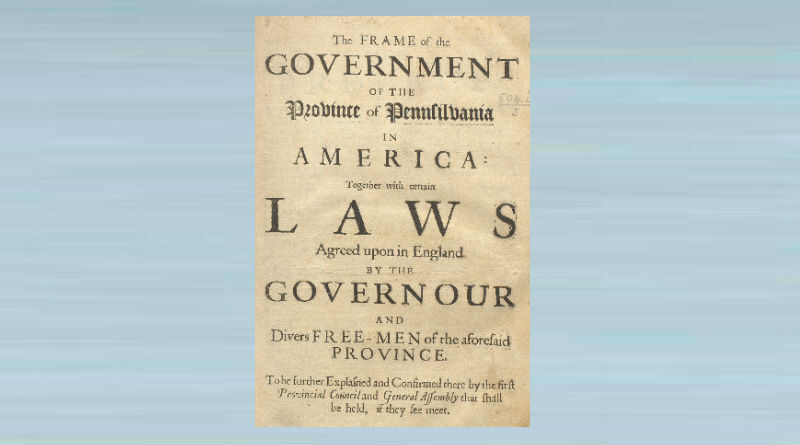The Frame of the Government of the Province of Pennsylvania
Updated on 6 February 2021
The Frame of the Government of the Province of Pennsylvania was written by the Quaker William Penn in 1682.
In 1681, King Charles II of England granted Penn a large tract of land on the west bank of the Delaware River. Charles I named Pennsylvania in honour of Penn’s father, Admiral Penn, and the granting of land was repayment for money the admiral had lent the king during the English Civil War Period (1642 – 1651).
Penn, a member of the Society of Friends, saw Pennsylvania as a refuge for Quakers and other persecuted groups of people. As a Quaker, Penn believed in religious toleration on both pragmatic and moral grounds. Penn believed that a harmonious society, unhampered by intolerance, would be a prosperous society as well.
In 1682, before he left England to become the first governor of Pennsylvania, Penn wrote The Frame of the Government of Pennsylvania, which served as the colony’s first constitution.
He sought to create a framework that would frustrate political wrong-doing and prevent a ruler from assuming absolute power to the detriment of the community. To prevent absolutism, Penn employed the concept of balancing forces, a concept that the Framers of the United States Constitution later would later use liberally in the separation of powers.
Most importantly for Penn, freedom of worship was to be absolute.
To make sure that The Frame of the Government of Pennsylvania would be able to change with the times, Penn included an amending clause. This was the first amending clause in any written constitution and again the idea was adopted for the Constitution.
The Charter of Privileges
The Frame of the Government of Pennsylvania went through three major revisions, known as Frames, in 1683, 1696 and 1701. The final Frame of 1701 is known as The Charter of Privileges and it lasted until Declaration of Independence in 1776.
Penn signed the Charter of Privileges for the Province of Pennsylvania and its Territories (full title) before he set sail for a return to England. This document planted his idealistic seed of a nation: a New World form of democracy.
It can be argued that his Charter of Privileges is the root of America’s free type of government. Among its provisions were: separation of church and state, representative self government, and independent religious choice.
In 1751, for the 50th anniversary of Penn’s Charter of Privileges, the Liberty Bell was made for the town hall and it rang out in celebration.
Influence Of Magna Carter
The Frame of the Government of the Province of Pennsylvania, and its accompanying ‘Laws agreed upon in England’, contained many provisions, or laws, based on the clauses of Magna Carta,
These included that, ‘All Courts shall be open, and Justice shall neither be sold, denyed nor delayed’ (Law V). Court proceedings, ‘May be understood, and Justice speedily administred’ (Law VII). Finally, ‘All fines shall be moderate’ (Law XVIII).
The first of these provisions closely echoed clause 40 of Magna Carta (‘To no one will we sell, to no one deny or delay right or justice’). Law XVIII in turn reflected clause 20, stating that fines should be proportionate to the offence committed.
This was the first time that an American colony had expressly adopted elements of Magna Carta as part of the initial act of colonisation.
Image from www.bl.uk

